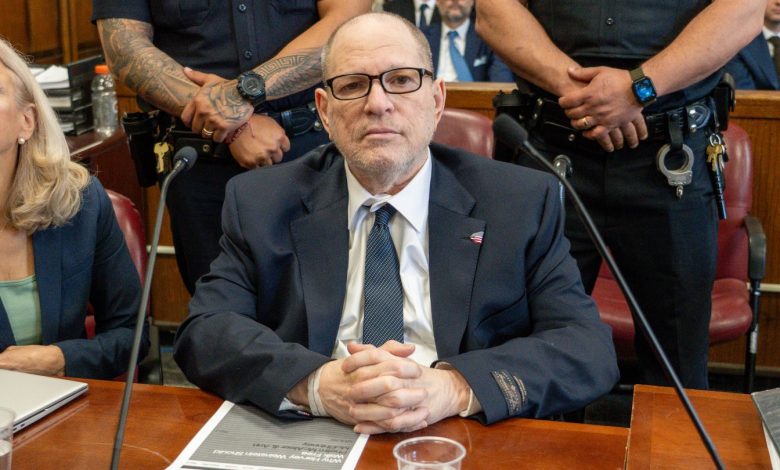New Harvey Weinstein Accuser Revealed as Opening Statements Begin in Retrial

Opening arguments in Harvey Weinstein’s retrial on rape and sexual charges in Manhattan began Wednesday, with prosecutors previewing testimony from two accusers at his 2020 trial as well as claims from a new accuser.
Weinstein is being retried on a criminal sexual charge and a rape charge related to respective claims from former production assistant on Project Runway, Miriam Haley, who alleges he forced oral sex on her at his TriBeCa apartment in 2006, and from aspiring actress Jessica Mann, who alleges she was raped by Weinstein in 2013 in a Manhattan hotel.
Weinstein is being newly charged with a criminal sexual charge related to claims from a third woman, Kaja Sokola, whose name was publicly revealed as part of the trial for the first time Wednesday.
Sokola was a model and actress who met Weinstein for the first time in 2002 when she was 16, and remained in contact with him for career opportunities, according to prosecutors. The charged interaction with Weinstein is alleged to have taken place in 2006, after a lunch meeting with Weinstein and her sister at a Manhattan hotel in which he persuaded her to come up to his hotel room to see a script and then forcibly held her down and performed oral sex on her.
Haley and Mann testified as part of Weinstein’s 2020 trial, but the conviction was overturned in April 2024 when the court of appeals ruled that the trial judge improperly allowed testimony from other women about uncharged allegations against Weinstein. He was sentenced to 23 years in prison at the 2020 trial.
Weinstein has pleaded not guilty to all charges in the new trial.
Sokola was also an extra in The Nanny Diaries, thanks to a referral from Weinstein, where she received special treatment and met the film’s stars, Alicia Keys and Scarlett Johansson, according to the prosecution.
While she had previously been known only as Complaining Witness #3 in this case, Sokola’s name previously made headlines after she filed a civil lawsuit against Weinstein’s brother Bob Weinstein, Disney and Miramax in 2019 and later won a $3 million settlement. In that incident, Sokola claimed that she had been sexually assaulted by Weinstein in 2002, when she was 16. She said he made her take her clothing off while in an apartment, he touched her vagina while forcing him to touch his penis.
Sokola and Haley also both previously received payouts from Weinstein’s team in order to release him from civil liability, as prosecutors disclosed in their opening statement. In his opening statements, Weinstein’s attorney, Arthur Aidala, pointed to those payouts to undermine the motivations of the witnesses.
“From this witness stand there will be four million reasons to lie,” Aidala told the jury. “That’s how much they all took.”
Assistant district attorney Shannon Lucey delivered the opening arguments for the prosecution, and in laying out backstories for these women brought up unwanted past sexual encounters the women allegedly had with Weinstein that are not charged in this case, as well as the fact that women came forward after Weinstein’s alleged behavior came to light in the media in October 2017 after the articles in the New York Times and The New Yorker. However, Lucey took care to not mention the #MeToo movement sparked by the publication of claims and said the claims from the women came not “because they felt momentum” but because they no longer felt alone.
Overall, Lucey pointed to the great power wielded by Weinstein as a Hollywood mogul.
“Harvey Weinstein had enormous control over those working in film because he decided who was in and who was out,” Lucey said.
“He used those dream opportunities as weapons, and in this trial you will hear he preyed on three women,” she continued.
Aidala, who delivered opening statements for the defense, argued that the encounters between Weinstein and the three women were consensual and evolved out of long relationships or friendships he had with them. While he notes that Weinstein had helped open the door to the industry for these women, he argued that, in these cases, “the casting couch was not a crime scene” and that there was a consensual exchange of sexual favors for opportunity.
“These were all based on relationships, friendships,” Aidala said. “They’re mutually beneficial relationships.”
While he noted that the actions from all parties may have been “immoral,” given that Weinstein was in a relationship and the women were allegedly seeking career advancement, he argued that this did not constitute a crime.
“There’s a lot of real estate between immorality and illegality,” said Aidala, who also pointed to the lengthy time between the alleged incidents and the women reporting them.
Weinstein was brought into the courtroom in a wheelchair Wednesday, as he has been for all other hearings, wearing a blue suit. He nodded at the first row of attorneys before joining his team at the defense table and mostly looked down or at Judge Curtis Farber during the prosecution’s opening statements and at Aidala during his opening statement.
All women were described by both parties as maintaining contact with Weinstein for years before and after the incidents, with many of the interactions motivated by a desire to move up in the entertainment industry.
The 2006 incident involving Haley, who got the job on Project Runway after meeting with Weinstein, allegedly occurred after Weinstein had tried to make several previous romantic passes at her, and had invited her to a movie premiere in L.A.
The 2013 incident with Mann came after the aspiring actress had met with Weinstein several times, under what prosecution says was the hope of career opportunities, and had also taken part in unwanted sexual encounters in some of those instances, according to the prosecution. In 2013, Mann called Weinstein to a hotel for a networking meeting with her friend, but was brought to a hotel room by Weinstein who “dragged her into the bedroom,” saying, “You owe me one more time,” and allegedly raped her.
The courtroom was packed with members of the media, attorneys, family members of the defense team, and Manhattan DA Alvin Bragg, who swiftly pursued the retrial of Weinstein after the producer’s prior conviction was overturned.
A jury of 12, with six alternates, was assembled over the past week composed of seven women and five men. The jury is diverse in terms of racial makeup and age.
Prosecutors previously said they expect the trial to take about four to six weeks and to call 25 witnesses.
Evidence is expected to include testimony from the three women, as well as former Weinstein assistants, a casting director who had been part of a movie in which Weinstein allegedly offered Mann a part and emails between Weinstein and the women, among other items.
The former mogul still faces a separate 16-year prison sentence in California after being convicted of rape in December 2022. However, his team is appealing that conviction.
Weinstein’s health issues, which include chronic myeloid leukemia, diabetes mellitus, coronary artery disease and more, cannot be discussed as part of the trial, per a pre-trial ruling from Judge Farber. However, Weinstein is currently being held at Bellevue Hospital after his team filed an emergency petition with the court last week asking to hold him there, rather than at Rikers, during the trial due to his worsening health.
Source: Hollywoodreporter
HiCelebNews online magazine publishes interesting content every day in the celebrity section of the entertainment category. Follow us to read the latest news.
Related Posts
- Josh Hartnett Makes Very Rare Social Media Appearance — and Says He’ll ‘Ghost’ Again for Another 10 Years
- Bridgerton star Bessie Carter’s famous boyfriend is her co-star – details
- ‘The Legend of Ochi’: Helena Zengel on Puppets, Primates and Willem Dafoe in A24’s Retro Fantasy
- LeBron James Claps Back After Rapper Kevin Gates Goes After His Wife Savannah James and Their Marriage
- Meet Ransom Canyon star Josh Duhamel’s famous model wife





